Page Contents
How is Santa Clara County Probate Real Estate Impacted by COVID-19?
To understand how COVID-19 is impacting Santa Clara County Probate and Probate Real Estate sales in Santa Clara County – let us look at the progression of events since the beginning on March 13, 2020, when President Trump declared the Coronavirus pandemic a national emergency.

Statewide Stay-At-Home Order Issued

On March 19, 2020, the Governor of California, Gavin Newsom declared a shelter-in-place order for most Californians to stay at home due to the Coronavirus pandemic.
Exceptions to the shelter-in-place order
• Essential activities
• Essential businesses
• Essential government functions
Real estate and many other associated businesses were not deemed essential businesses. The California Association of Realtors urged the governor and the State Public Health Officer to expand permissible activities for REALTORS® while maintaining the health and well-being of the real estate agents and their clients.
 During this time real estate agents were conducting as much business as possible virtually. Real estate agents were expected to stop all in-person marketing and sales activity. This includes listing appointments, showing appointments, property inspections, and open houses. Consumers and clients are also subject to the orders which means no one should be visiting properties.
During this time real estate agents were conducting as much business as possible virtually. Real estate agents were expected to stop all in-person marketing and sales activity. This includes listing appointments, showing appointments, property inspections, and open houses. Consumers and clients are also subject to the orders which means no one should be visiting properties.
Tracking and monitoring the Multiple Listing Service (“MLS”) data many sellers withdrew their listing with the news of the shelter-in-place order and restrictions on showing properties.
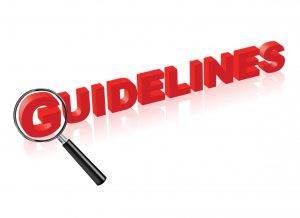
Once the real estate industry was recognized by the Department of Homeland Security as being necessary for the maintenance of America’s Critical Infrastructure and included in the list of essential businesses on March 28, 2020, the California Association of Realtors (“C.A.R.”) published Best Practices Guidelines that must be followed in all circumstances. The guidelines came with a warning to check with the City or County for More Restrictive Shelter in Place Orders. The more restrictive local orders apply and must be followed. Another example of how one size does not fit all.
In addition to the Best Practices Guidelines, on March 31, two new forms were released by C.A.R. to further assist its members in transacting real estate business during the shelter-in-place order.
- Listing Agreement Coronavirus Addendum or Amendment. This is for sellers and listing agents to sign.
- Property Viewing Advisory and Declaration. This is to be signed by the seller, buyer, agents, and anyone entering a property.
During the week of April 13, 2020, through April 17, 2020, three (3) new forms were released by C.A.R.
- Coronavirus Lease/Rental Addendum or Agreement
- Notice of Unforeseen Lease/Rental Coronavirus Circumstance
- Coronavirus Lease/Rental Property Entry Advisory and Declaration
- Updated the following forms:
- Coronavirus Addendum or Amendment
- Notice of Unforeseen Coronavirus Circumstance
- Listing Agreement Coronavirus Addendum or Amendment
- Coronavirus Property Entry Advisory and Declaration
To say that we are working in uncharted territory is an understatement.
On April 10, 2020, C.A.R. held a virtual town hall meeting with over 300 people across the state in attendance. We are all in this together – let us work together to chart the path moving forward.
Updated Real Estate Industry Guidance Released by the State of California
On May 7, the State of California released new Industry Guidance for Real Estate Transactions. The guidance requires all real estate offices to ensure certain steps are taken prior to reopening.
Restrictions and Guidelines for Real Estate Transactions
“Industry Guidance: Real Estate Transactions,” was issued by the Department of Public Health on May 8, 2020. This requires real estate agents to post rules on the property, with pictograms, that must be agreed to by all people as a condition to viewing the property.
To meet this requirement, the California Association of Realtors created the “Interim Rules Form” pictured below.
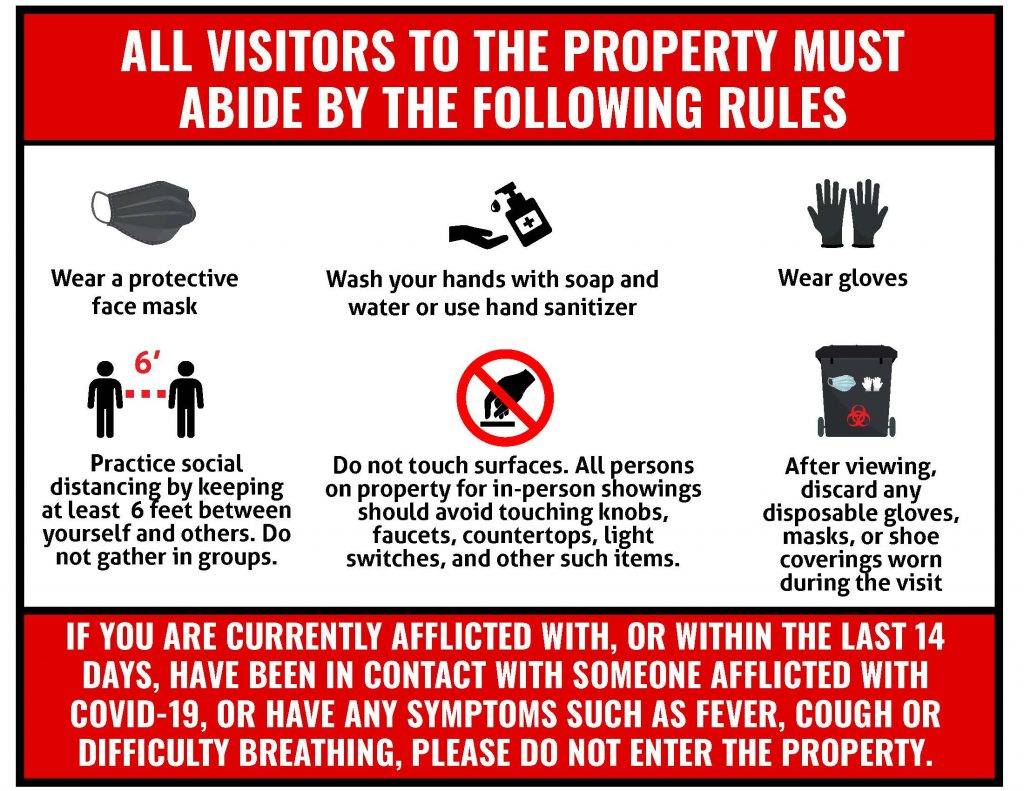
To comply in part with the new Industry Guidance, real estate agents and brokers must post the Interim Rules Form and the PEAD form at the entrance of a property. A sample PEAD form is pictured below.
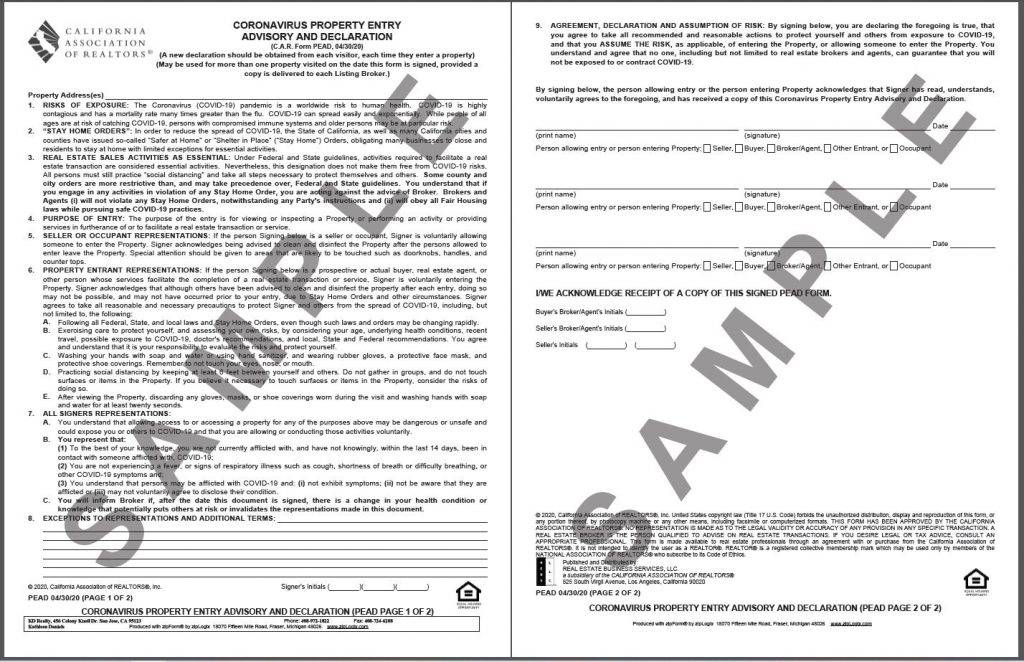
This is only partial compliance until the California Association of Realtors legal team releases its comprehensive approach. At this time, there are three additional COVID forms used in real estate transactions. Following the guidelines and using the COVID forms extends beyond risk management – its crisis management.
UPDATE MAY 23, 2020: The California Association of Realtors released guidelines consistent with Governor Newsom’s stay-at-home order issued March 19, 2020. The guidelines incorporate the directives of the California Department of Public Health and Industrial Relations (Cal/OSHA) “COVID-19 INDUSTRY GUIDANCE: Real Estate Transactions” in effect during Stage 2 Expansion of the “Resilience Roadmap” (as updated March 12, 2020).
Real Estate Best Practices Guidelines and Prevention Plan for Showings During COVID-19 – Stage 2 Expansion is adopted by Kathleen Daniels, Broker-Owner, NeedProbateHelp.com.
Best-Practices – BPPP dated 7-13-2020
Legal Update Webinar | May 11, 2020
During a Legal Update Webinar presented on May 11, 2020, the two attorneys presenting opened the meeting by saying:
- “Things are changing so quickly it is hard to keep up.”
- “It has been nothing but change since it all started.”
- “We have had nothing but change since Mid-March 2020 in what real estate agents could do and how it could be done.”
 The legal webinar discussed the following:
The legal webinar discussed the following:
In early April, for an in-person visit to a property, it had to be completely vacant, meaning nobody lives in the property. Showings had to be conducted “virtually”. Santa Clara County allowed real estate agents and other professionals such as photographers to have some access.
Santa Clara County shelter-in-place extended from May 3, 2020, to May 31, 2020, and Open Houses are still not allowed.
As of May 3, 2020, limitations on in-person visits are relaxed to state:
“… if a virtual viewing is not feasible, by appointment with no more than two visitors at a time residing within the same household or living unit and one individual showing the unit (except that in-person visits are not allowed with the occupant is present in the residence.” [emphasis added]
Bottom Line for Santa Clara County
- A seller and/or tenant allows access
- Occupants vacate the residence during visits
- Visits are scheduled by appointment
- Visits limited to two (2) adults and one real estate agent
- Physical distancing or “social” distancing is followed
- Protocols for safety are followed (wearing a mask & hand sanitizer)
- California Association of Realtors PEAD form is signed by all parties
If all the above conditions are met, then

- Real estate agents can do in-person showings even when an occupant resides in the home however, the occupant must vacate during the showings
- Signs can be posted
- Property can be staged
- Repairs and maintenance can be provided by gardeners, contractors, painters, electricians, landscapers
- Real estate agents may access to complete their Agent Visual Inspection Disclosure
- Inspections can be completed by buyers and sellers
- Stagers can remove staging
- Movers can move out belongings
The Counties’ Appendix A and the Cal OSHA checklist differ. For now, the use of Appendix A is recommended. We wait for a clear direction from Santa Clara County regarding which form is more restrictive. We must always default to the most restrictive.
The attorneys pointed out that the issue with the guidelines and real estate is that they were not written by anyone who transacts real estate. The authors did not consult with the California Association of Realtors legal team or any of the Association of Realtors.
Essentially, they took practices they apply to businesses and applied them to how to show a property. Businesses are not one-size-fits-all.
As of today, Appendix A must be completed and posted at the properties being shown.
Violating a Shelter-in-Place Order
The risks of violating the order are clients and real estate agents could be fined if found guilty of a misdemeanor. Fines would need to be paid by the real estate agent violating the order. Errors and Omissions Insurance does not cover violations of law.
For example, if a real estate agent hosts an open house during the shelter-in-place when doing so is not allowed.
Other risks:
- Real estate agents, buyers, and sellers could get sick
- People can be sued for getting someone else sick
- If abused, there could be a major crackdown on the entire real estate industry
Actions of all people can have significant consequences. The liability for not following the law is not one-size-fits-all.
Crisis Management vs. Risk Management
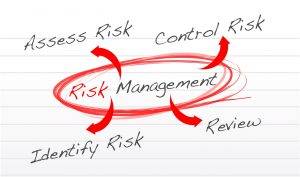 Every business deal with Risk Management. Real estate is no exception. The world was not prepared for the coronavirus or how to manage the crisis.
Every business deal with Risk Management. Real estate is no exception. The world was not prepared for the coronavirus or how to manage the crisis.
The California Association of Realtors legal team created forms to be used statewide once the federal government clarified real estate was an “essential business”.
One issue with the statewide forms is that many counties within the State of California created their own restrictions. Real estate agents must work with the most restrictive restrictions within the City or County.
The COVID forms are used as a best practice. The use of the forms helps real estate agents and brokerage to manage the risk.
Legal Considerations
 The COVID forms may not be understood by buyers, sellers, and/or their real estate agents or brokers. Adding to that, the forms continue to change.
The COVID forms may not be understood by buyers, sellers, and/or their real estate agents or brokers. Adding to that, the forms continue to change.
Whenever the California Association of Realtors or a local association creates a new form, it must be studied and understood, at the highest level possible, before using the form.
The forms most certainly are not designed to be an exercise in sign here, sign here, sign here. Whoever signs the forms must also understand what they are signing, and the risks involved.
Our best practice at Need Probate Help is to recommend clients hire a local qualified California Real Estate Attorney to review the forms and explain them.
The COVID-19 forms are crisis management forms. These extraordinarily complex forms are beyond the scope of traditional non-pandemic real estate transactions. Real estate agents are not qualified to address the legal complexities. We are not licensed to practice law. We are licensed to practice real estate. Agents that attempt to explain the forms may be exposing clients to unexpected risks with unintended consequences.
Santa Clara County Probate Court – Department 13
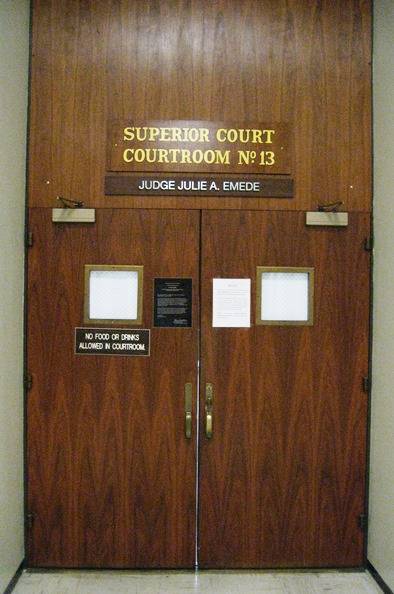 In keeping with the Health Officer of Santa Clara County Order, significant measures are being taken at the Superior Court of Santa Clara County. The following measures have taken place for the Probate Court.
In keeping with the Health Officer of Santa Clara County Order, significant measures are being taken at the Superior Court of Santa Clara County. The following measures have taken place for the Probate Court.
Updates From The Court
It is an ever-changing and evolving process. The following highlights the series of events and updates from the Court.
March 16, 2020
- April Seminar and New Attorney Roundtable events postponed.
- Matters on the morning probate calendars set for March 17th through April 6th will be continued.
- Conservatorship matters scheduled on Tuesday afternoon will continue to be heard however only emergency or urgent matters will be heard. All others will be continued.
- Parties are to appear by telephone.
- Conservator and Conservatee appearance is waived.
- If determined during the hearing personal appearance is necessary, the matter will be continued.
- Expect the court will be able to process ex parte requests.
March 18, 2020
- Workflows adjusted to accommodate minimal staff presence in Court.
- Process for ex parte matters outlined.
- Ex parte process is only for urgent matters.
- Heggstad petitions and petitions to modify a trust, and other similar matters once the court returns to normal functionality and hours.
- E Filings may be submitted and will be processed in the order received when the court returns to normal operations.
March 23, 2020
- Santa Clara County Superior Court issued a General Order and Press Release regarding restrictions on visitors entering the Courthouse.
April 3, 2020
- Update from Probate Judge regarding managing cases through May 3, 2020, subject to change.
- Department 13, Probate Department continues to hear the Tuesday afternoon Conservatorship matters. Only Conservatorships have been deemed essential.
- All other matters will be continued.
- The court will continue to process emergency conservatorships, special administrations, and other urgent matters.
- E Filings started to move through the processing queue.
April 3, 2020
- General Order RE: Implementation of Emergency Relief issued. The order extends deadlines for filing documents.
April 6, 2020
- Emergency rules of the California Rules of Court adopted.
April 9, 2020
- General Order Regarding Appearances of Conservatees and Involuntary Patients filed with the Santa Clara County Superior Court.
April 14, 2020
- The Court is getting things back online with increased remote working capacity from probate examiners and court investigators.
- The court continues to process matters that can be processed during the shelter-in-place orders.
- Use the Court’s drop-box to get certified copies of Letters and originally executed documents. Payment and a self-addressed stamped envelope must be included to process.
- Drop-Box documents are processed on Tuesdays.
April 17, 2020
- Emergency Rule 12 was adopted by the California Judicial Council. This rule requires parties to accept electronic service.
April 30, 2020
- Zoom Conference Held: Santa Clara County Probate Court in The Times of Coronavirus
May 1, 2020
- The Court begins proceedings to close estates on petitions that were already filed IF (1) the Personal Representative is the sole heir; or (2) all heirs have waived an accounting and notice.
- The process outlined on how to proceed with the above matters.
- The court continues to adapt operations to move cases forward under challenging circumstances created by COVID-19.
May 7, 2020
- Requests for the Discharge of Conservators, Administrators, and Bonds are being processed
- The first group of petitions to close estates when all heirs consent and waived notice/accounting or petitions with sole heirs, were approved without a hearing, signed, and are being processed.
- Beginning May 18, 2020, the regular 9 am calendars will proceed with matters currently set. Expected all parties will appear by Court Call.
- Starting May 27, 2020 petitions to close an estate (First and Final Account, Report, and Final Distribution) already set on the calendar will be heard. It is expected all parties will appear by Court Call.
- Public Access Line in Department 13 – Probate is up and running. Instructions to call in can be found on the court website.
May 13, 2020
- Santa Clara County General Order: All persons who enter the courthouses must wear a face-covering in all public areas of the court and shared workspace. Physical distancing at least 6 feet from others must be practiced.
Certified Probate Real Estate Specialist – Kathleen Daniels, Broker

Notes from Zoom Conference Held on April 30, 2020
Santa Clara County Probate Court in The Times of Coronavirus
- The Team holds meetings every morning via Zoom.
- The court is exempt from the shelter-in-place order but only when performing essential functions.
- The court had to get up and running remotely as quickly as possible.
- It takes time to set up remote systems.
- Criminal cases get priority due to the constitutional time requirements.
- Criminal and dependency are up and running remotely.
- All cases are important. They are doing the best they can to get all up and running remotely.
- March 21, 2020, limited public access to the court to people who had an essential reason to be there. The means of public access are limited to listen-only call-in lines.
General Operations of the Court:
- E-Filings are processed remotely by people working at home.
- The probate attorney is working remotely from home and in court.
- Probate Examiners are working remotely for the most part
- A Clerk is in the office a couple of days a week to process filings.
- Conservatorship Calendar: for documents with original signatures or orders after the hearing, use the Dropbox located inside the court.
- Court Call is the remote access line the court is using. The court is in the process of providing a public remote access line for the public to listen to court proceedings as if they were in the courtroom. Dept 13, the Probate Department will pilot that on Tuesday, May 5, 2020. If the pilot goes well, the line will be available to the public.
Essential Probate Operations
- Conservatorships
- Ex Partes
Limited Conservatorships
- Proceeding as scheduled
- Court Investigators are conducting interviews by phone/video
- San Andreas Regional Center Reports are being prepared
- If all reports are in good order they are moving forward
- New cases come through the Court’s Dropbox
- All contested matters get continued
General Conservatorships
- Proceeding as scheduled
- Court Investigators are conducting interviews by phone/video
- Accountings are not currently being scheduled
- All contested matters get continued
Conservatorship Hearings
- The Probate Examiner completes the review by Friday
- Court Call is used for hearings
- Conservatees do not need to personally go to court – some appear by telephone
- Orders are signed electronically
Ex Partes – Urgent
- Temporary Conservatorships. Urgent matters include medical decisions, abuse, and neglect
- Special Administration of Estates. Must state why is it an emergency. Currently, all are awaiting a hearing. The judge determines case by case. Examples of what may be considered urgent are:
- Property damage, depreciating assets, pending foreclosure
- Urgent Estate or Trust matters. For example, if under contract for the sale of a property and will be lost if not approved, and it is not contested
Ex Partes – Non-Urgent
- Heggsted Petitions, with consent
- Trust Modifications, with consent
Preliminary Distributions of Estates
- The court must have all complete documents and meets all other requirements
Appointment of Guardian Ad Litem
Appointment of Private Judge, Referee, etc.
- Must be delivered through Dropbox … not electronically
Perspective
 Until Petitions to Administer an Estate are heard, Orders for Probate granted and signed, Letters Testamentary or Letters of Administration issued, and Bonds issued, if required, the short answer is, the impact is severe.
Until Petitions to Administer an Estate are heard, Orders for Probate granted and signed, Letters Testamentary or Letters of Administration issued, and Bonds issued, if required, the short answer is, the impact is severe.
New cases will get in line and wait for the court to get through an already backlogged calendar.
How long will it be before the courts open and we resume a new normal?
Nobody knows. We manage one day at a time and wait to see what tomorrow will bring.
Once your case is heard, give us a call. We specialize in probate real estate. We understand the probate process and keep current on the ever-changing real estate environment during the coronavirus crisis. Our clients are grateful for our knowledge and experience and for our compassion and understanding from our own personal experience dealing with the loss of many family members.
Does this paint a picture of how COVID-19 is impacting probate real estate in the Santa Clara County Probate Court?
We are here to answer all of your real estate questions. For help, contact us to request a consultation or call 408-972-1822.